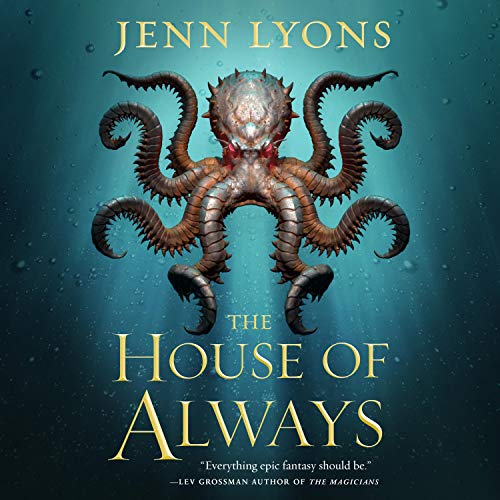 The House of Always (A Chorus of Dragons, #4) by Jenn Lyons
The House of Always (A Chorus of Dragons, #4) by Jenn Lyons Format: audiobook, eARC
Source: purchased from Audible, supplied by publisher via Edelweiss
Formats available: hardcover, paperback, ebook, audiobook
Genres: epic fantasy, fantasy
Series: Chorus of Dragons #4
Pages: 523
Published by Tor Books on May 11, 2021
Purchasing Info: Author's Website, Publisher's Website, Amazon, Barnes & Noble, Kobo, Bookshop.org
Goodreads
For fans of Brandon Sanderson and Patrick Rothfuss, The House of Always is the fourth epic fantasy in Jenn Lyons' Chorus of Dragons series that began with The Ruin of Kings.
What if you were imprisoned for all eternity?
In the aftermath of the Ritual of Night, everything has changed.
The Eight Immortals have catastrophically failed to stop Kihrin's enemies, who are moving forward with their plans to free Vol Karoth, the King of Demons. Kihrin has his own ideas about how to fight back, but even if he's willing to sacrifice everything for victory, the cost may prove too high for his allies.
Now they face a choice: can they save the world while saving Kihrin, too? Or will they be forced to watch as he becomes the very evil they have all sworn to destroy.
My Review:
“All of this has happened before, and all of this will happen again.” Or so says Ecclesiastes, Peter Pan, and at least a couple of the Cylons in Battlestar Galactica. But as at least one of the characters responds in BSG, “But the question remains: does all of this have to happen again?”
And I’m beginning to believe that THAT is the central question of this entire projected-to-be-five-books epic. Whether just because the history has repeated means that it has to repeat yet again. But I’ve thought I’ve figured out the central theme of this epic before, and so far I’ve been wrong every time.
Absolutely fascinated, but wrong. So we’ll see.
Like the previous books in the series, The House of Always is told from two different perspectives, seemingly from a point in the future, which does not necessarily mean that any of the characters survived, only that their chronicles did.
This time it’s Kihrin, trapped in Vol Karoth’s prison all by himself, discovering that all of his assumptions about the Dark God’s maturity, capability and power were seriously off the mark, and that he’s in so far over his head that he may never surface except as a tortured facet of the King of Demons.
That the other half of the story is narrated by the mage Senera from the Lighthouse at Shadrag Gor – otherwise known as the House of Always from the title – means that I finally know which of the two actors from the previous audiobooks was Kihrin and which was Thurvishar. Not that I needed to know, but it was niggling at me and now it’s not.
The story being told by these two narrators ranges backwards and forwards in time, as Kihrin and the companions who eventually join him in Vol Karoth’s mindscape prison AND the remaining members of the quest equally trapped at the Lighthouse find themselves being repeatedly mind-raped by the Dark God.
Vol Karoth doesn’t believe in love or friendship or faith or trust or any positive emotion of any kind. As far as he’s concerned, it’s all lies and deception, whether of the self or others. Kihrin believes the exact opposite. Their battle of minds and memories is a device to convince each other in a contest where the winner will take all, literally, of the world and of each other’s very existence.
It’s a battle that Kihrin somehow has to win. In spite of how everything seems, Vol Karoth is not really Kihrin’s enemy. Kihrin’s enemies are waiting outside, so far unaware that Kihrin has become another player of their game and not a pawn on either of their boards, as he has been in all of his previous incarnations.
If Kihrin wins, there’s a chance this time to stop the endless cycles of history. If he loses, the demon Xaltorath will have another turn of the cycle to keep bending history to their will. And the wizard Relos Var will have another turn of the cycle to try to destroy the world before that happens.
Not that either of them is on the side of the right or the angels. Even if one of them thinks he is.
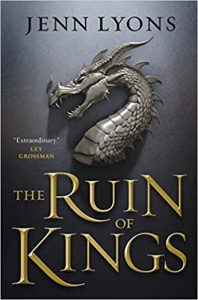 Escape Rating A: There is, as is ALWAYS true of this series, a lot to unpack in this entry. And just like all of the previous books in the series, you won’t care to unpack it or understand why it’s important to unpack if you haven’t read the previous books. Start with The Ruin of Kings and be prepared to be swept away, only to be left ashore at the end of this one with an epic book hangover and an intense desire to get the final book immediately.
Escape Rating A: There is, as is ALWAYS true of this series, a lot to unpack in this entry. And just like all of the previous books in the series, you won’t care to unpack it or understand why it’s important to unpack if you haven’t read the previous books. Start with The Ruin of Kings and be prepared to be swept away, only to be left ashore at the end of this one with an epic book hangover and an intense desire to get the final book immediately.
All of that being said, and as much as I love this series as a whole, this is the first time that the book in hand isn’t even more epic than its predecessor. Not that it isn’t downright excellent, just that it suffers a bit in comparison. Also, this is kind of a middle book, not that it ends in a slough of despond as middle books often do, but rather that it contains a lot of character development and exposition and filling in of the corners and footnotes (this whole series is built on footnotes!). There’s a lot of process in this one, as we get a lot of the underpinning of the worldbuilding and a lot of pieces moving into place to set up the finale.
Also, this one is a bit harder to follow than usual. Not that all the stories haven’t jumped back and forth in time more than a bit, but the nature of this entry in the series is that neither group we’re following is in a place where time is in any way fixed. Kihrin, and eventually others are literally inside Vol Karoth’s head, and the rest are in the Lighthouse at Shadrag Gor, which is nicknamed the House of Always because “real time” outside passes very, very, very slowly.
The entire story, except for the very end, is framed in places that are essentially moored in an eternity of limbo. Or limbo of eternity. Stuff happens, and it happens in a kind of order, but it’s interspersed with memories that happened before that happen out of their order at least some of the time and it’s easy to get a bit lost.
Which doesn’t mean that a lot of important stuff doesn’t happen, just that it’s difficult to get a handle on when and in what order it happened. It all comes together at the end to set up the final volume, but in the middle it gets a bit muddled.
One of the very interesting things that gets revealed is that the Eight Immortals who are worshipped as gods are much more like the Incarnations of Immortality from Piers Anthony’s long ago series than they are the Elven Gods of Dragon Age. Meaning that the functions of those Eight Immortals; Death, Luck, Magic, etc., are offices that have been held by different people through the repeated cycles of history. After several of the so-called gods were killed at the end of The Memory of Souls, those offices are vacant and the concepts they represent are searching for replacements.
Which leads directly to the final book in the series, The Discord of Gods. It’s possible that the new gods who begin to assume their mantles in this book are going to have very different visions of what they should do about the forces that are contending for power. Not that they were all exactly getting along swimmingly before.
But the gods aren’t the only players on this particular field. The demon Xaltorath has been shifting history in order to create a version of the world where they and the demons win – so they can eat everyone. Relos Var has been manipulating everyone towards his vision of the “greater good” in the hopes of destroying everything so that he can save the pieces that are left.
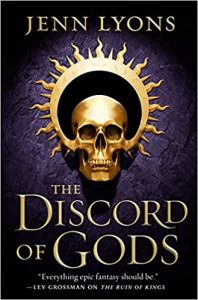 Both sides believe that Kihrin is just a pawn they’ve been playing with for cycles and millennia. He thinks he’s got them fooled, and that he’s playing them in order to save the people he loves – and everyone else – into the bargain.
Both sides believe that Kihrin is just a pawn they’ve been playing with for cycles and millennia. He thinks he’s got them fooled, and that he’s playing them in order to save the people he loves – and everyone else – into the bargain.
They could all be right. They could all be wrong. Or any combination thereof. We’ll all find out in The Discord of Gods, which would seem to be the version of Ragnarok to which the entire epic has been leading. The end of the world as they know it is coming next April. And I’ve never looked forward to doomsday so much.

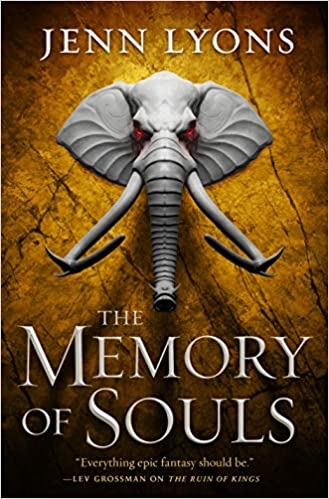 The Memory of Souls (A Chorus of Dragons, #3) by
The Memory of Souls (A Chorus of Dragons, #3) by 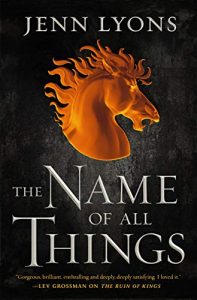 Escape Rating A++: Last year’s entry in this series,
Escape Rating A++: Last year’s entry in this series, 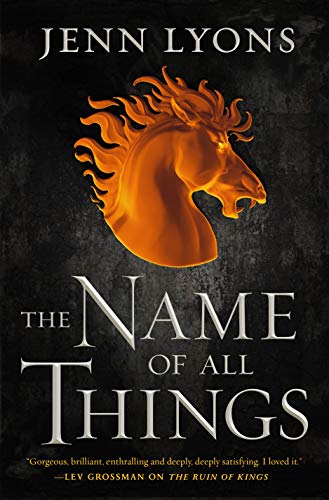 The Name of All Things (A Chorus of Dragons, #2) by
The Name of All Things (A Chorus of Dragons, #2) by 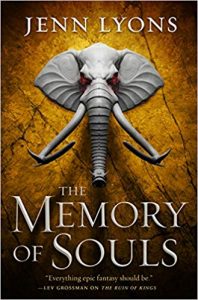 One of the other things that makes this series so mesmerizing is that it is never a simple contest of good vs. evil. Everything in this world is in shades of gray. The gods are not really gods. However, the demons, for the most part, at least so far, seem to really be demonic. But the characters who commit evil acts, like Relos Var and Senera, may have the best of motives. And may still be evil at the same time. Nothing is clear but everything is compelling.
One of the other things that makes this series so mesmerizing is that it is never a simple contest of good vs. evil. Everything in this world is in shades of gray. The gods are not really gods. However, the demons, for the most part, at least so far, seem to really be demonic. But the characters who commit evil acts, like Relos Var and Senera, may have the best of motives. And may still be evil at the same time. Nothing is clear but everything is compelling.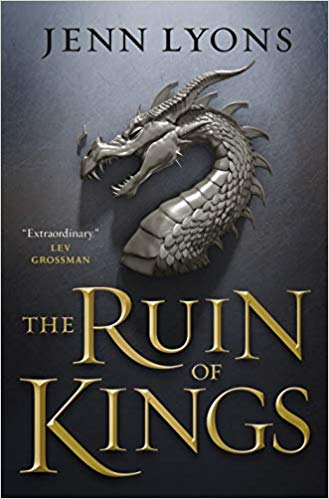 The Ruin of Kings (A Chorus of Dragons, #1) by
The Ruin of Kings (A Chorus of Dragons, #1) by